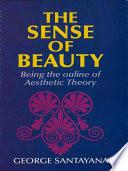The Sense of Beauty is a book on aesthetics by the philosopher George Santayana. The book was published in 1896 by Charles Scribner's Sons, and is based on the lectures Santayana gave on aesthetics while teaching at Harvard University. Santayana published the book out of necessity, for tenure, rather than inspiration. In an anecdote retold by art critic Arthur Danto of a meeting with Santayana in 1950, Santayana was reported to have said that "they let me know through the ladies that I had better publish a book... on art, of course. So I wrote this wretched potboiler."The book is divided into four parts: "The Nature of Beauty", "The Materials of Beauty", "Form", and "Expression". Beauty, as defined by Santayana, is an "objectified pleasure." It does not originate from divine inspiration, as was commonly described by philosophers, but from a naturalistic psychology. Santayana objects to the role of God in aesthetics in the metaphysical sense, but accepts the use of God as metaphor. His argument that beauty is a human experience, based on the senses, is influential in the field of aesthetics. However, Santayana would reject this approach, which he called "skirt[ing] psychologism," later on in life.According to Santayana, beauty is linked to pleasure, and is fundamental to human purpose and experience. Beauty does not originate from pleasurable experiences, by itself, or from the objects that bring about pleasure. It is when the experience and emotion of pleasure intertwines with the qualities of the object that beauty arises. Beauty is a "manifestation of perfection", and as Santayana writes, "the sense of beauty has a more important place in life than aesthetic theory has ever taken in philosophy."

